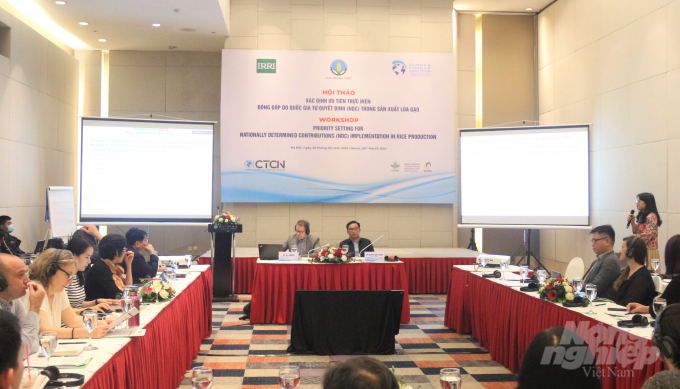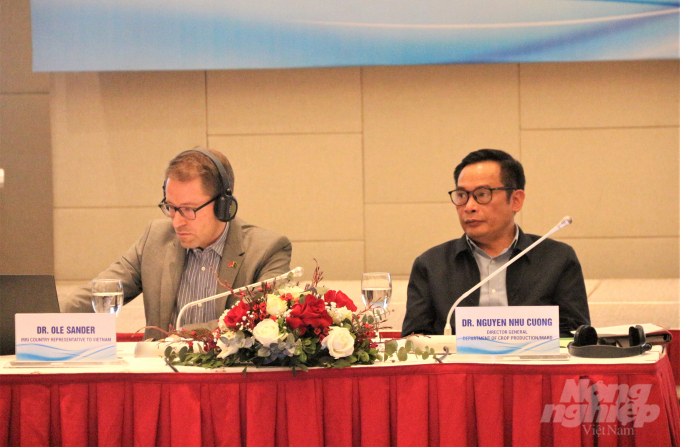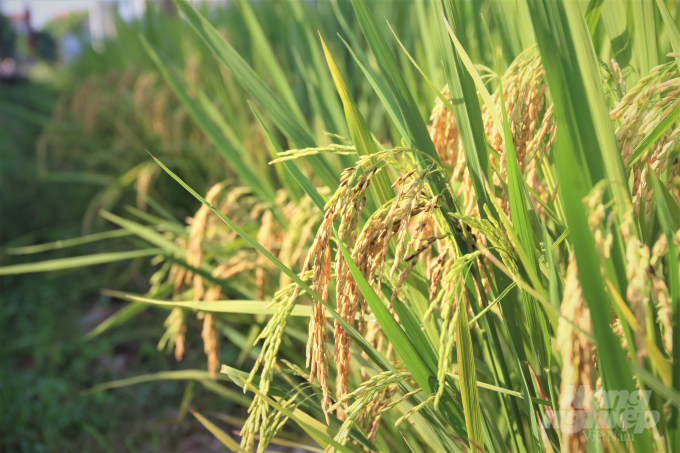November 28, 2025 | 03:25 GMT +7
November 28, 2025 | 03:25 GMT +7
Hotline: 0913.378.918
November 28, 2025 | 03:25 GMT +7
Hotline: 0913.378.918

: The workshop to set priorities for Viet Nam's Nationally Determined Contribution (NDC) implementation plan for the rice sector was held on March 26 in-person and online in Ha Noi. Photo: Pham Hieu.
Reducing greenhouse gases emission in rice production would bring sustainable benefits to socioeconomic development and environmental protection.
The Department of Crop Production of Viet Nam under the Ministry of Agriculture and Rural Development, in collaboration with the International Rice Research Institute (IRRI) and the Climate & Clean Air Coalition (CCAC), on March 26 organised a workshop to set priorities for Viet Nam's Nationally Determined Contribution (NDC) implementation plan for the rice sector.
The workshop is the first of its kind that aims to help Viet Nam to identify priority measures for NDC implementation in the agriculture and rural development sectors.

Head of the Department of Crop Production of Viet Nam, Nguyen Nhu Cuong (right) and head of the International Rice Research Institute’s Country Office in Vietnam Ole Sander at the workshop. Photo: Pham Hieu.
Scenarios for NDC implementation in the rice sector were introduced at the workshop.
The rice sector plays an important role in agriculture and rural development, ensuring national food security, social security and affecting the livelihood of many farmers. In Vietnam, the rice sector has advantages in ecological conditions and it is associated with the country’s cultural values and heritages of a long-standing wet rice civilization.
However, the rice sector in Vietnam is facing challenges relating to low efficiency, resource intensiveness, environmental pollution and climate changes.
According to the agriculture ministry, a project on restructuring the rice sector during the period 2025-2030 was approved early this year, expected to increase efficiency and ensure sustainable development for the industry.
Under the project, Vietnam would implement measures to form and increase the efficiency of rice value chains, adapt and mitigate climate changes’ impacts, protect the environment, increase farmers’ income and consumers’ interests as well as export high-quality rice.
In September 2020, Vietnam submitted its NDC implementation plan. IRRI has developed and analyzed three scenarios for the NDC implementation of the rice sector.

Reducing greenhouse gases emission in rice production will generate sustainable socio-economic and environmental benefits. Photo: Pham Hieu.
The scenarios show the benefits of farming techniques helping farmers increase their net income through reducing the cost of paddy cultivation, increasing health and environmental benefits and bringing great economic potential from carbon credit when a carbon trading market takes shape in Vietnam.
IRRI, CCAC, CTCN and the Research Programme on Climate Change, Agriculture and Food Security developed a toolkit to support Vietnam in making NCD implementation plan including MapAWD - mapping tool suitable for application of irrigation techniques. Alternate wetting and drying (AWD), SECTOR - a tool to calculate greenhouse gas emissions in rice production, and COMPARE - a cost-benefit analysis tool in rice cultivation.
Translated by Bich Huong
/2025/11/27/3830-1-152901_403.jpg)
(VAN) Dong Nai is developing its key crop areas, expanding planting area codes, and applying high technology to increase the value of agricultural products, aiming at a green and sustainable agriculture.

(VAN) Tay Ninh’s livestock sector is undergoing a major transformation, applying high-tech, closed-loop circular models to build sustainable value chains.
/2025/11/26/3627-4-082628_818.jpg)
(VAN) From a small café on the red basalt highlands, Le Van Hoang started a business with clean coffee, building Enjoi Coffee into a symbol of organic agriculture in the Lam Dong plateau.
/2025/11/25/0045-1-135246_13.jpg)
(VAN) Ca Mau is researching a model of sea-encroaching embankments combined with viaducts and logistics service zones, aiming both to prevent erosion and create land funds for marine economic development.

(VAN) The information was shared at the seminar 'Urban Agriculture - Solutions for Developing Green Spaces,' organized by the Kinh te & Do thi Newspaper and the Biotechnology Center of Ho Chi Minh City.
/2025/11/19/4141-2-132831_216.jpg)
(VAN) One of Japfa's outstanding solutions is implementing digital transformation and artificial intelligence (AI) to optimize operations, enhance productivity, and advance sustainable development.
/2025/11/19/4847-1-093540_448.jpg)
(VAN) The Gia Lai Provincial People’s Committee had a working session with the delegation of the U.S. Department of Agriculture, the State of Idaho, and representatives of the State's leading enterprises.